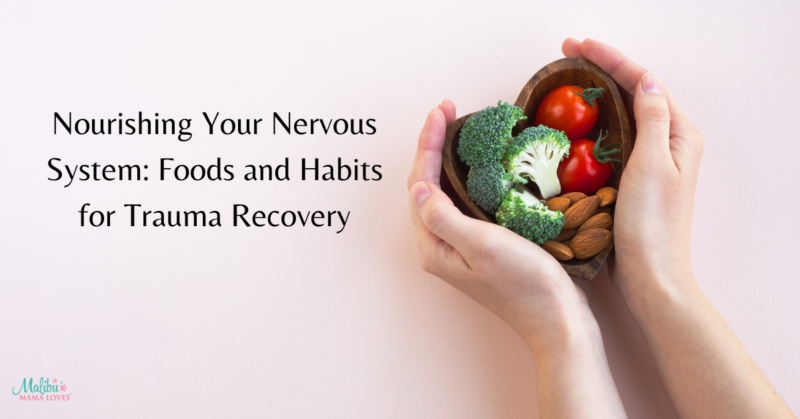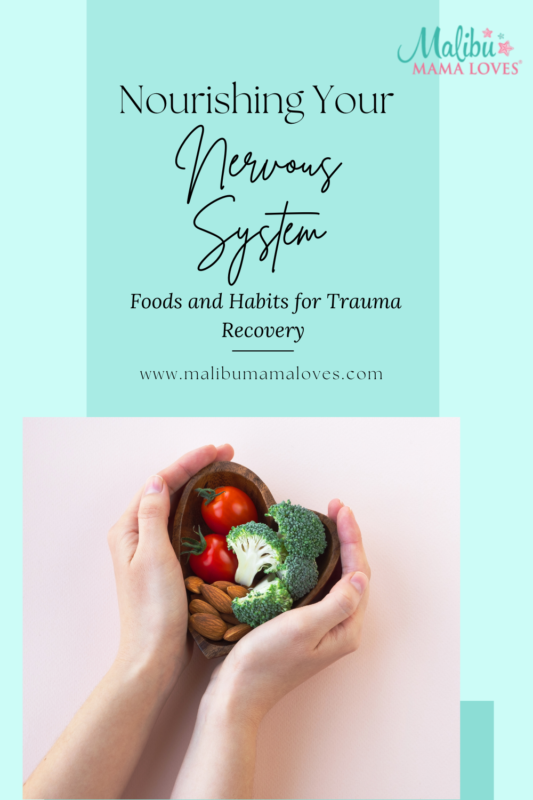Nourishing Your Nervous System: Foods and Habits for Trauma Recovery
Trauma doesn’t just affect our hearts and minds, it impacts our entire body, particularly our nervous system. When we experience stress or trauma, our bodies can get stuck in a heightened state of “fight or flight,” leaving us feeling overwhelmed, anxious, or disconnected.
Healing the nervous system is a key part of trauma recovery, and a nourishing diet combined with mindful habits can play a powerful role in this process.
Here Are 8 Foods & Habits That Aid In Trauma Recovery:
-
Hydration is Key
Dehydration can exacerbate stress and anxiety. Drinking enough water helps regulate bodily functions, including nerve signaling and stress response. Adding a pinch of sea salt or Himalayan salt to your water can also help maintain electrolyte balance, which is crucial for nervous system health. One of my favorite electrolyte drinks is found here.
-
Magnesium-Rich Foods
Magnesium is a calming mineral that plays a significant role in reducing stress and promoting relaxation. It helps regulate cortisol, the stress hormone, and supports deep sleep. Include magnesium-rich foods like spinach, avocado, almonds, and dark chocolate in your diet to promote a sense of calm. I like to use magnesium oil on my feet before bed, I’ve noticed a huge difference in my sleep when I remember to put it on!!
-
Protein for Blood Sugar Stability
Eating balanced meals with adequate protein is essential for maintaining steady blood sugar levels. When blood sugar spikes and crashes, it can worsen anxiety and irritability. Protein-rich foods like eggs, legumes, and lean meats help stabilize your energy, keeping your mood steady throughout the day.
-
Omega-3 Fatty Acids
Omega-3 fatty acids found in fatty fish, flaxseeds, and walnuts have been shown to reduce inflammation and support brain health. They’re particularly helpful in trauma recovery, as they protect brain function and regulate mood.
Pin this:
-
Gut Health and Mental Clarity
The gut-brain connection is real—many neurotransmitters like serotonin are produced in the gut. Supporting your gut health with probiotic-rich foods like yogurt, kimchi, and kefir can improve both your physical digestion and emotional well-being. One thing I love to use in Colostrum, find my favorite kind here.
-
Anti-Inflammatory Foods
Chronic inflammation can intensify trauma symptoms. Incorporate anti-inflammatory foods like berries, turmeric, ginger, and green tea into your diet to help reduce stress-induced inflammation and promote nervous system healing. I’ve started putting turmeric right on a number of things (including my morning lemon water!!), it has no taste, but so many benefits!
-
Breathwork for Calming the Nervous System
Breath is one of the most powerful tools for calming the nervous system. Slow, deep breathing can activate the parasympathetic nervous system—the body’s natural “rest and digest” mode. Practices like diaphragmatic breathing, box breathing, or simply taking long, deep breaths can help reduce anxiety, lower heart rate, and bring a sense of grounded calm as it oxygenates your blood. Incorporating breathwork into your daily routine, even for just a few minutes, can have a profound impact on your trauma recovery.
-
Mindful Habits
In addition to nourishing foods, mindful habits like yoga, deep breathing, and meditation are essential for calming your nervous system. These practices activate the body’s relaxation response, reduce tension, and bring you back to a state of balance.
Healing from trauma requires a holistic, non-linear approach. By nourishing your body with the right foods and cultivating mindful habits, you can support your nervous system in its journey to recovery.
Ready to get started right now? Click here!
Malibu Mama Loves Xx




 Hi There! Let's Share ✩ Explore ✩ Awaken together! I’m a Mama, published author, biohacker, and trauma-informed life coach raising conscious kids who truly appreciate our world through travel. Welcome to the Malibu Mama Loves Conscious Living Lifestyle!
Hi There! Let's Share ✩ Explore ✩ Awaken together! I’m a Mama, published author, biohacker, and trauma-informed life coach raising conscious kids who truly appreciate our world through travel. Welcome to the Malibu Mama Loves Conscious Living Lifestyle!




 Ready To Turn Your Trauma Pain Into Purpose? Join Our FREE Masterclass Click
Ready To Turn Your Trauma Pain Into Purpose? Join Our FREE Masterclass Click 


